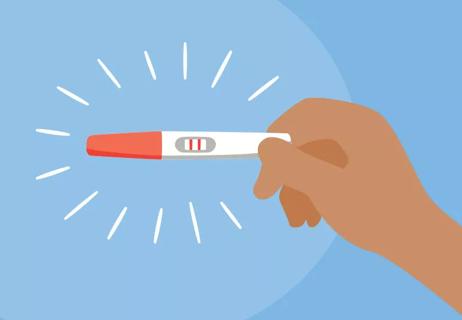Can pregnancy tests be wrong?

Maybe you can’t wait to have a baby. Or maybe that’s the last thing you’re hoping for.
Advertisement
Cleveland Clinic is a non-profit academic medical center. Advertising on our site helps support our mission. We do not endorse non-Cleveland Clinic products or services. Policy
Either way, if you think you might be pregnant, you need to know for sure. But what are the odds a positive pregnancy test might be wrong?
“Home urine pregnancy tests are pretty reliable,” says Ob/Gyn Jonathan Emery, MD. “But there are some reasons you might get a false-positive result.”
Dr. Emery explains when and why a pregnancy test might give a false positive — and what you can do to make sure the stick doesn’t lie.
When you get pregnant, your body produces a hormone called human chorionic gonadotropin, or hCG. Home pregnancy tests look for that hormone in your urine. If hCG is present, you should get a positive test result when you pee on a stick.
But hCG levels start out very low and increase over time. If you take the test too soon after conceiving, it might say you’re not pregnant when you really are.
In other words, timing can lead to a false negative. But what about a false positive?
False positives aren’t super common, Dr. Emery says. But they’re not impossible. Some potential causes include:
You took a pregnancy test and got two lines. (Positive!) But a few days later, your period arrived in force. What gives? The most common reason this happens is an early pregnancy loss, also known as a chemical pregnancy. In this case, the test was accurate — there was a pregnancy, but it wasn’t a viable one, Dr. Emery explains.
Advertisement
“It’s not technically false since a very early pregnancy did occur,” he says. “But this is the most common reason that a pregnancy test might appear to have been false.”
“A lot of fertility treatments involve taking hCG injections,” Dr. Emery says. If you’ve been taking fertility medications, that hCG might still be floating around your system.
That could trigger a positive pregnancy test, even if you’re not pregnant. To avoid that mix-up, wait at least two weeks after your last hCG injection to take a home pregnancy test, he says.
If you were recently pregnant, you might still have leftover hCG in your system. After childbirth, miscarriage or treatment for ectopic pregnancy, the hormone can remain in your body for up to four to six weeks, Dr. Emery says. “That could lead to a positive pregnancy test when your body just hasn’t cleared the hCG yet.”
Home pregnancy tests aren’t especially hard to use. But you still have to pay attention since a mistake can lead to incorrect results.
If you wait too long to read the results, for example, or use more drops of urine than the test calls for? You might want to take the answer with a grain of salt. “If you don’t follow all the instructions, any results — positive or negative — could be false,” Dr. Emery says.
Luckily, false positives are rare. And there are steps you can take to make sure your home pregnancy test gives you results you can trust.
Home pregnancy tests are inexpensive, private and quite reliable, Dr. Emery adds. “People often don’t believe what they’re seeing. But if you’ve used the test correctly and done it at the right time, it’s probably true.”
Advertisement

Sign up for our Health Essentials emails for expert guidance on nutrition, fitness, sleep, skin care and more.
Learn more about our editorial process.
Advertisement

While it’s probably not your most fertile time, it is possible to get pregnant if you have unprotected sex during your period

There’s only one proven way to stack the deck in favor of a boy or a girl

While 80% of women will get pregnant within six months, age and other factors make a difference

How a BMI in the overweight or obesity range affects ovulation and how to increase fertility

A fertility specialist talks timeline, diet and other prep steps

The short answer from an Ob/Gyn

The short answer from an Ob/Gyn

An Ob/Gyn explains the question of timing

Even small moments of time outdoors can help reduce stress, boost mood and restore a sense of calm

A correct prescription helps your eyes see clearly — but as natural changes occur, you may need stronger or different eyeglasses

Both are medical emergencies, but they are very distinct events with different causes